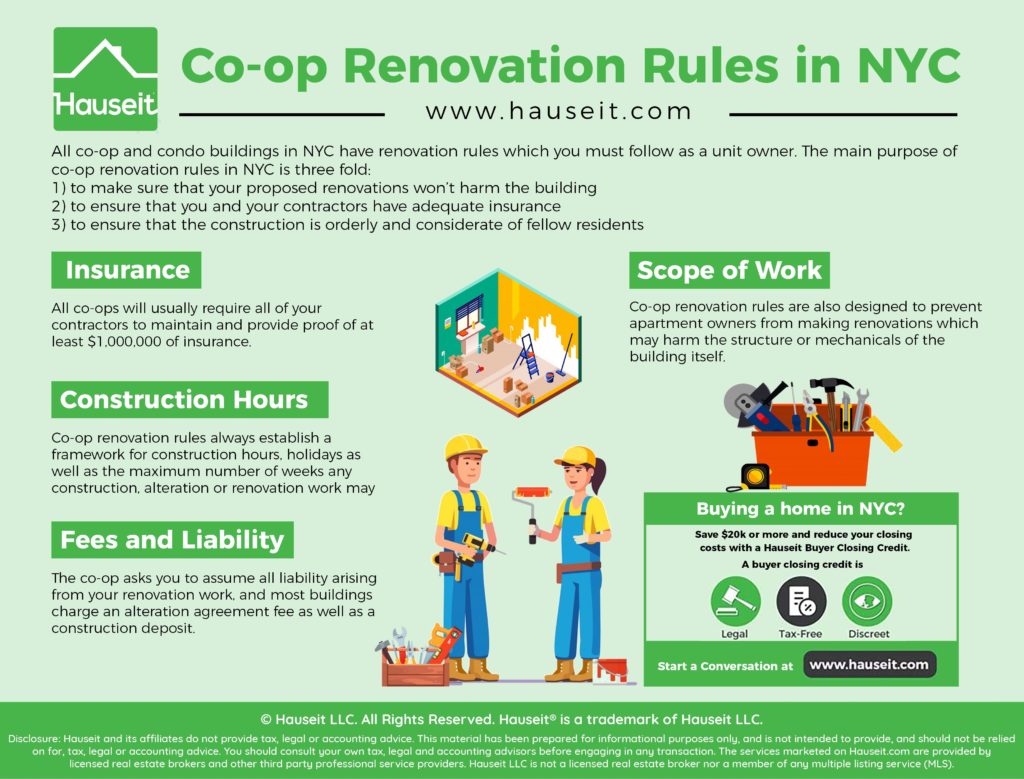Thinking about buying a coop in NYC and renovating it? If so, it’s important to know that all co-op and condo buildings in NYC, both large and small, have renovation rules which must be followed.
A co-op or condo building’s rules for renovations are usually listed in the Alteration Agreement. A copy can be obtained from the managing agent or the Board of Managers.
The main purpose of co-op renovation rules in NYC is to make sure that your proposed renovations won’t harm the building, to ensure that you and your contractors have adequate insurance, and to maximize the likelihood that construction is orderly and considerate of fellow residents.
Table of Contents:
The construction industry in NYC is highly litigious, and it’s quite common for contractors to sue clients, subcontractors / employees to sue contractors and apartment owners/buildings, and everything in between.
Therefore, all co-ops will usually require all of your contractors to maintain and provide proof of at least $1,000,000 of insurance.
Contractors are almost always required to possess comprehensive personal liability insurance, property damage insurance, workers’ compensation and employee liability insurance policies.
Under the terms of the alteration agreement, each contractor is usually required to submit a Certificate of Liability Insurance and Workers’ Compensation naming the co-op, managing agent, unit owner (yourself) and the board of managers as “additional insured” on the certificate.
Here is an example of the insurance provision from an alteration agreement for a co-op in lower Manhattan:
Our Discretion, Your Advantage
Our traditional partner brokers never openly discount which means less disruption and better execution for you.
Co-op renovation rules are also designed to prevent apartment owners from making renovations which may harm the structure or mechanicals of the building itself. As such, the co-op will typically require to pay for the building’s architect and engineer to review the plans of your proposed renovations.
It’s also common for co-ops and most older condo buildings to prohibit apartment owners from increasing the amount of electrical capacity in an apartment. Here is an example of this language:
Finally, it’s also common for co-ops to require an inspection of your alterations before work is completed.
For example, when replacing/repairing bathroom and kitchen plumbing, the building may require the super to inspect the pipes before you’re allowed to close the walls.
Some co-ops have blanket prohibitions on specific types of alterations, such as installing a washer / dryer or adding another bathroom.
The latter is considered an expansion of the existing ‘wet area’ of an apartment, which refer to the kitchen and bathrooms (areas with plumbing). Washer / dryer restrictions may also be mentioned in a co-op’s house rules.
Save 2% On Your Home Purchase
Save thousands on your home purchase with a buyer agent commission rebate from Hauseit
Co-op renovation rules always establish a framework for construction hours, holidays as well as the maximum number of weeks any construction, alteration or renovation work may last.
A typical co-op building in NYC usually only permits construction between 9am to 5pm, which is stricter than NYC’s construction hours (7am to 6pm).
Furthermore, most co-ops will further restrict you from making any unusually loud noises until 10am each morning.
Most co-ops also prohibit any construction work on Saturdays, Sundays and holidays.
In rare cases, a co-op (or condo) may permit non-noise making work on the weekends such as plastering and painting.
Many co-ops also prohibit the use of jackhammers or any unusually loud tools such as electrical hammers, electric saws or other electrical power tools at all times unless prior approval is given by the building.
In addition, all co-op alteration agreements will require you to provide a minimum amount of notice to the building and your immediate neighbors in advance of commencing any alteration work.
Co-ops may also restrict the total length of time you’re allowed to renovate. A common maximum is 4 months. This is designed to prevent apartment owners from constantly changing their plans and creating semi-permanent construction. Co-ops with elevator capacity issues may also cap the number of apartments which are permitted to be renovated at the same time.
Renovating your co-op is another great opportunity for the co-op and its managing agent to charge you fees. Most co-ops will charge you a non-refundable alteration agreement processing fee, in the same way they charge you a fee when submitting your purchase application.
In addition, many co-ops will require you to make a deposit in advance of beginning your renovations. The deposit is returned provided that your alterations do not cause any damage to the common areas of the building.
Another purpose of the alteration agreement is to allow the co-op to make you assume absolute liability for any monetary or other damages which are caused by your renovation work. You’ll typically be required to sign the alteration agreement and submit this along with the fee(s), proof of insurance, contractor quotes and architectural/engineering plans.
A Full Service Listing for 1%
Sell your home with a traditional full service listing for just one percent commission.
Originally Published: 10/29/18 | Last Updated: April 9th, 2020
Disclosure: Hauseit® and its affiliates do not provide tax, legal, financial or accounting advice. This material has been prepared for informational purposes only, and is not intended to provide, and should not be relied on for, tax, legal, financial or accounting advice. No representation, guarantee or warranty of any kind is made regarding the completeness or accuracy of information provided.








what is the law for renovating a co-op on Sunday using power tools and hammering
Great question Joseph! There’s isn’t a law, but rather each co-op will have its own set of building specific House Rules which will govern items like this. It’s fairly common to see co-op house rules allow general renovations to occur from Monday through Friday, from 9am to 5pm. Some co-ops may allow renovations on Saturday as well, but it’s totally case by case.
Any comment about the DIY Homeowner. Is it possible to do small renovations: i.e. painting, fixing a bathroom, replacing a vanity on your own, without the contractor? Would like to hear your opinion.. Thanks
Great question! Doing small renovation work yourself in a NYC co-op apartment without a contractor usually won’t cause any problems unless you’re making a lot of noise, working outside of business hours or drawing lots of attention in the common areas (i.e. lobby and elevators) by trucking supplies through the building. Both co-op and condo buildings in NYC will require unit owners doing extensive renovation work to sign an Alteration Agreement. The purpose of the Alteration Agreement is to indemnify the building against the work you do, ensure that your contractors have sufficient insurance, safeguard the common areas against any alterations which may harm the building and to make sure that construction happens during appropriate working hours.
Minor construction work such as painting usually doesn’t make any noise nor does it affect the structure of the building in any way. Furthermore, doing the work yourself means that contractor insurance is obviously less of an issue since you aren’t inviting anyone into your home to actually do the work. Using an Alteration Agreement is therefore less important for this type of situation.
It’s always possible that your neighbors could report you to the co-op board if you’re making too much noise or if they simply don’t like you. At that point, the co-op board has the full discretion and authority to make you complete an Alteration Agreement or possibly the less robust Decorative Rider which some buildings may have to handle minor renovation work.
When in doubt, it’s always a good idea to check with your building’s managing agent or to ask your neighbors before doing any renovation work whatsoever. The last thing you want is to fall into a dispute with your co-op board, as they can obviously ruin your life when it comes time to sell by simply rejecting all of your buyers!
I have a neighbor living in the apartment above me and he has been renovating a one bedroom apt. for the past 14 1/2 months with no end in sight, he works on it every single day and even on weekends and holidays, including Christmas day. He works past 6pm up to 8pm most days and once until midnight.. Who can I complain to about this where they can do something about it?>
Hi Joseph, you should speak with your managing agent or someone on your condo or co-op board about this. Most condo and co-op buildings will have house rules which stipulate during what hours and days of the week that renovation work is permitted. Some buildings’ house rules will even have a maximum time limit for how long renovations can go on, to prevent such a situation where renovations drag on endlessly. Please leave a comment after you figure it out, we’d love to hear how it worked out for you!
I am renovating 2 bathrooms and kitchen. Super stops in most days and gives his opinion and advice. I have already paid him outright for one small job. Do I need to tip him at the end of this 2 1/2 to 3 month renovation? If so, how much? This is a coop building and the contractor I am using was recommended by the super and does a lot of other renovations in the building. Also, I am going to pay super to reinstall some appliances. Please let me know you if tip for super in this situation is customary. Thank you!
Hi Jane, this is a great question! If the super is voluntarily stopping by each day to give you valuable tips and advice for your renovation, it does seem like he is going above and beyond the typical responsibilities he has concerning routine maintenance your unit. If you’ve tipped in the past and he has been appreciative, it may be a nice gesture to offer him something nominal as a token of gratitude. That being said, tipping can be a slippery slope if it leads to unreasonable expectations for additional tips and compensation in the future, especially if the advice he’s giving you (although helpful) isn’t necessarily something you’re willing to actually pay out of pocket for.
It’s also fairly common for a contractor to offer a referral fee for being introduced to new jobs, so it’s possible that your super already benefitted from the fact that you hired the contractor he recommended. Perhaps you can just remind the super that you intend to hire him to reinstall some appliances after the renovation, and in the meantime you are greatly appreciative of his assistance!
hello,
we want to renovate a coop studio in brooklyn.
management asks for general contractor , electrician and plumber licenses and insurances.
for the electrical and plumbing work we have licensed people but for everything else we
getting regular workers (not general contractor since they charge a lot)
we need to replace wall and ceilings sheetrock, paint it, put new floors and tiles.
does this type of work require a general contractor or we can argue with the board about it ?
thank you
Hi Artur – we’re excited to hear about your renovation plans! Keep in mind that for liability reasons no co-op or condo building will ‘officially’ allow you to hire any unlicensed individual or entity to do renovation work inside your apartment. We suggest that you request quotes from 5 to 10 contractors and try negotiating down the price with whomever you decide to hire. The best way to find contractors is to ask for recommendations from friends, co-workers and neighbors. You can also look up which contractors were used for other renovation projects in your building using the Department of Buildings website.
~Team Hauseit